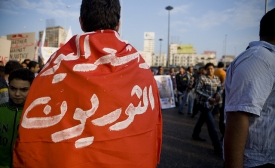arab spring
This issue also adds a layer of complexity for foreign governments with digital diplomacy and public diplomacy programs that use social media. They will need to develop an understanding of the meanings and context of hashtags as they evolve and to understand how words may be played with and what the use of former colonial languages may be signalling, if anything.
In the region, the step from energy to the vital issue of peace and security is not far. Also, Turkey’s “soft power” as a forerunner of democratization, free trade and a liberalized economy in the Arab Spring, makes its role indispensible.
Peter Frisch, a senior political analyst at the European External Action Service...recommended that the EU work with Arab nations to develop more solid tourism strategies, ensure that democratic leaders stay in power, use public diplomacy to talk to the people and reach out to them...
The Parliamentary Foreign Affairs Select Committee is holding an investigation into British Foreign Policy and the Arab Spring...Lord Malloch-Brown has got plenty to say about ‘electronic solidarity’ and the uprisings, the inapplicability of the Marshall Plan analogy...

The Arab Spring is the topic of the USC Center on Public Diplomacy’s latest Media Monitor report. The report looks at the unprecedented revolution in five key nations – Tunisia, Egypt, Syria, Libya and Bahrain – and considers the wide-ranging implications for public diplomacy.
I am often told that Syria is not Libya and that any intervention would lead to a disproportionate death of civilians, making such an intervention unacceptable and unjustifiable. I would argue that the morality justifying the need for intervention in Syria is indisputable.







